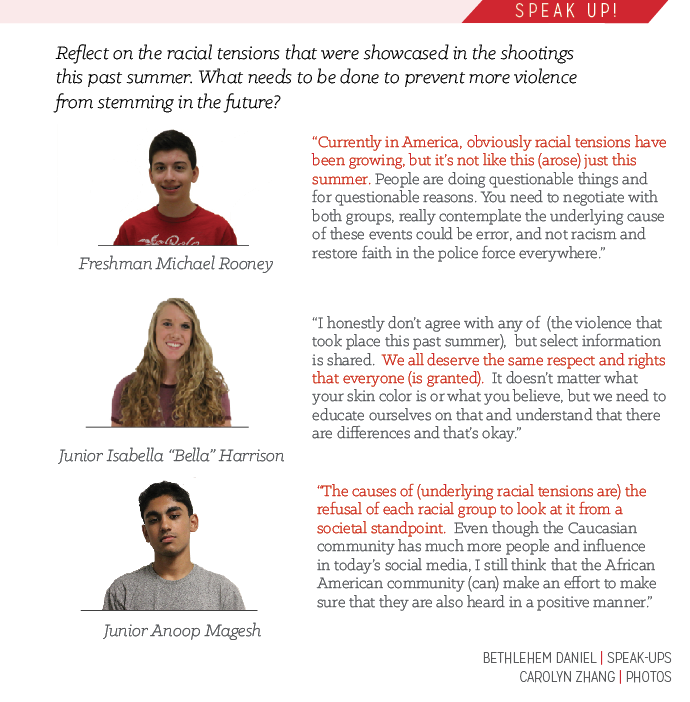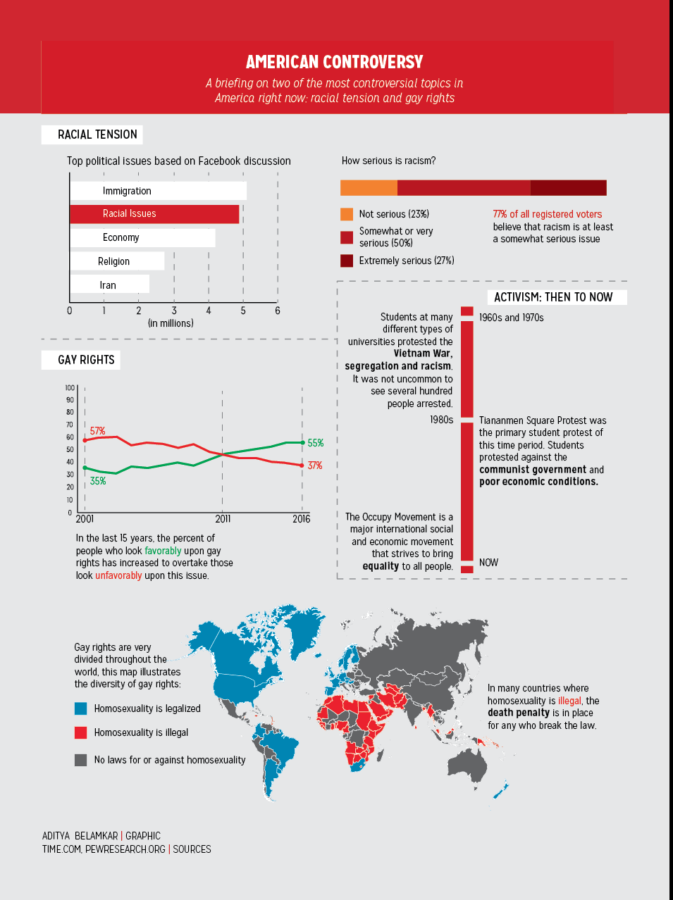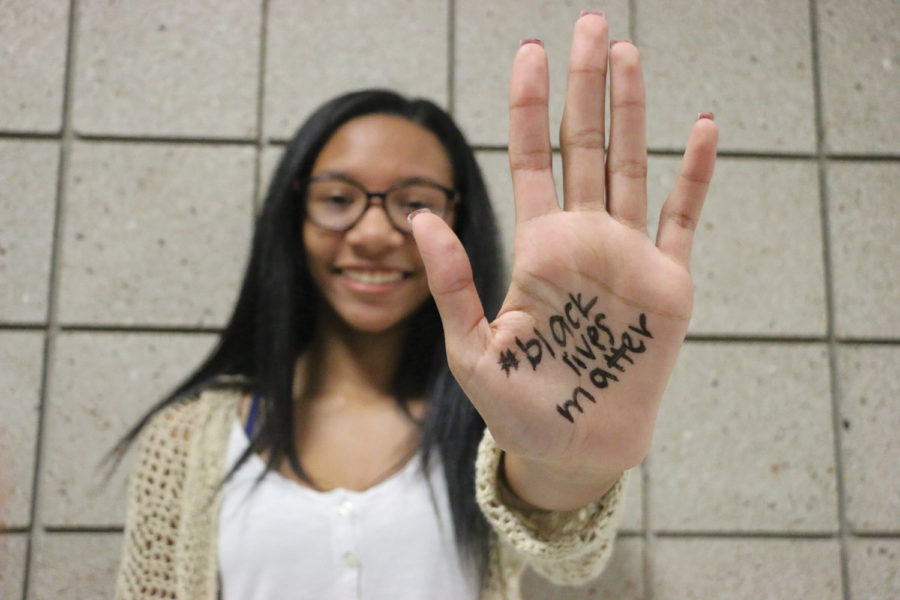It all started on July 13, 2013, when the first ever appearance of the hashtag #BlackLivesMatter was seen on Twitter. Activism has grown since then, especially with recent events like the five-to-four supreme court ruling on same-sex marriage on June 26, 2015 that ruled that all states must allow same-sex marriage.
An Aug. 15 study published by Pew Research Center found the use of the #BlackLivesMatter hashtag spiked on specific events including Michael Brown’s death in Aug. of 2014 and the Charleston church shooting in June of 2015, but maintained a constant usage rate throughout the years.
As more controversial topics arise in today’s society, especially in regard to new social media platforms, some wonder whether students, who use these platforms, have a role to play in these important and vital discussions.
Jazlyn Visor, Black Student Union president and senior, said she believes students should participate, “(In) the world, I think, we have to make a change,” she said. “It should be in our hands. We’re the next generation, so we should try to do something that will make a great impact.”
To try to make their own impact, both Visor and Blair Scott, Black Student Union member and sophomore, said they welcome others to join them to promote unity in the black community, and CHS as a  whole as well.
whole as well.
“I think that everyone should join Black Student Union. You don’t just have to be black to join; you can come and learn about the culture and what we stand for,” Scott said. “Even if you just want to help us out that would be great.”
Jeremy Stacy, Black Student Union sponsor and science teacher, said the club helps students to localize racial issues.
“With everything that’s going on in the media today, a lot of times we’ll just come into class and talk about what’s going on in the media during our club meetings and how it could relate to ‘Could it ever happen here at Carmel?’ ‘What could we change?’ or ‘How could we get the culture to change in our little community of Carmel or Carmel High School?’, “ Stacy said. “I think it’s important for (members) to see both sides of the race issue that’s going on in our country.”
According to The Atlantic, student activism has grown rapidly in regard to “racial and educational justice.” According to Peter Dreier, the Dr. E.P. Clapp Distinguished Professor of Politics at Occidental College in Los Angeles, the young population has significant potential power om driving activism.
Dreier said, “There’s the power of money, and then there’s the power of numbers, In addition, Dreier said activism really depends on what kind of world you wan t to live in.
t to live in.
“The purpose of activism is to fix injustice, fix unfairness, to get people involved in change. It’s basically here (to teach them) to help themselves and not have anyone else do it for them,” Dreier said.
Nonetheless, race is not the only issue students are able to discuss through various outlets – gay rights are also another prevalent issue that has been in the spotlight.
Jeremy Horner, Gay-Straight Alliance (GSA) sponsor and science teacher, said sexuality, like race, is not a subject that is easily broached within present-day societal practices and social behaviors.
Horner said, “I think there’s a lot of cultural baggage. I think the underlying current of that is, though, (sexuality is) something that for a long period of time is easily hidden, so it can fly under the radar, and people don’t have to necessarily see it or interact with it.”
He continued, “I think that’s slowly changing because there is a lot more openness, and now it’s something, (with) people who are ‘out’ as opposed to being ‘in,’ and I think that’s the biggest issue. I think as society is becoming more open, you get more interaction between different groups.”
According to Horner, clubs such as GSA try to educate students and build a community where students can openly voice their opinion. Furthermore, Dreier believes it is important to become involved in presenting one’s views on current and imperative issues.
“The radical ideas of one generation are often the common sense of the next. A hundred years ago women didn’t have the right to vote, and now they do.,” Dreier said.
He continued, “A hundred years ago that was considered radical. People would say, ‘Women can’t have the right to vote. You must be crazy, or a communist or utopian, unrealistic. Then women protested (considered radical), and they got the right to vote. Ten years ago, most Americans thought that same-sex marriage was a bad idea, and now most Americans think it’s a good idea; that’s because gay people protested.”
“So that’s what I mean by ‘the radical ideas of one generation are often the common sense of the next,’” he said. “People engage in protest and social activism, and (they) can change people’s hearts and minds about something that was once considered radical like minimal wage, the right to vote or social security. When we think about things today that are considered radical, like the death penalty, imagine that someday, we might just eliminate it.”


































![AI in films like "The Brutalist" is convenient, but shouldn’t take priority [opinion]](https://hilite.org/wp-content/uploads/2025/02/catherine-cover-1200x471.jpg)









































![Review: “The Immortal Soul Salvage Yard:” A criminally underrated poetry collection [MUSE]](https://hilite.org/wp-content/uploads/2025/03/71cju6TvqmL._AC_UF10001000_QL80_.jpg)
![Review: "Dog Man" is Unapologetically Chaotic [MUSE]](https://hilite.org/wp-content/uploads/2025/03/dogman-1200x700.jpg)
![Review: "Ne Zha 2": The WeChat family reunion I didn’t know I needed [MUSE]](https://hilite.org/wp-content/uploads/2025/03/unnamed-4.png)
![Review in Print: Maripaz Villar brings a delightfully unique style to the world of WEBTOON [MUSE]](https://hilite.org/wp-content/uploads/2023/12/maripazcover-1200x960.jpg)
![Review: “The Sword of Kaigen” is a masterpiece [MUSE]](https://hilite.org/wp-content/uploads/2023/11/Screenshot-2023-11-26-201051.png)
![Review: Gateron Oil Kings, great linear switches, okay price [MUSE]](https://hilite.org/wp-content/uploads/2023/11/Screenshot-2023-11-26-200553.png)
![Review: “A Haunting in Venice” is a significant improvement from other Agatha Christie adaptations [MUSE]](https://hilite.org/wp-content/uploads/2023/11/e7ee2938a6d422669771bce6d8088521.jpg)
![Review: A Thanksgiving story from elementary school, still just as interesting [MUSE]](https://hilite.org/wp-content/uploads/2023/11/Screenshot-2023-11-26-195514-987x1200.png)
![Review: "When I Fly Towards You", cute, uplifting youth drama [MUSE]](https://hilite.org/wp-content/uploads/2023/09/When-I-Fly-Towards-You-Chinese-drama.png)
![Postcards from Muse: Hawaii Travel Diary [MUSE]](https://hilite.org/wp-content/uploads/2023/09/My-project-1-1200x1200.jpg)
![Review: "Ladybug & Cat Noir: The Movie," departure from original show [MUSE]](https://hilite.org/wp-content/uploads/2023/09/Ladybug__Cat_Noir_-_The_Movie_poster.jpg)
![Review in Print: "Hidden Love" is the cute, uplifting drama everyone needs [MUSE]](https://hilite.org/wp-content/uploads/2023/09/hiddenlovecover-e1693597208225-1030x1200.png)
![Review in Print: "Heartstopper" is the heartwarming queer romance we all need [MUSE]](https://hilite.org/wp-content/uploads/2023/08/museheartstoppercover-1200x654.png)




